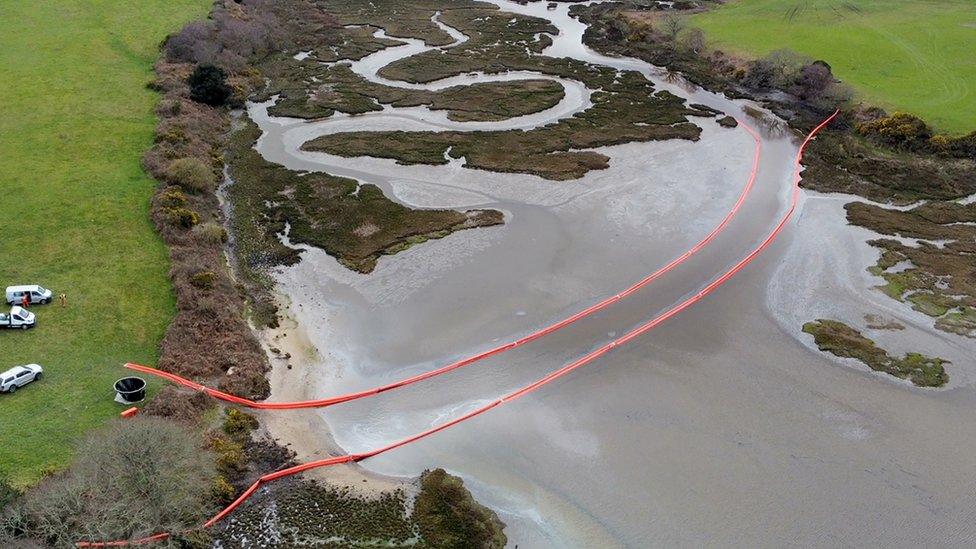Environment Agency workers strike over pay
- Published
- comments

Thousands of Environment Agency workers began a three day strike on Friday over claims of "endemic low pay".
The latest action from the Unison trade union will see staff working on flood defences, river pollution and fires walk out.
These emergency response teams say they are too thinly stretched, making it difficult to protect communities and keep the environment safe.
The government said representatives are meeting with the unions to discuss pay.
The strike began at 19:00 and will end at 07:00 Monday morning,
It follows months of industrial action by Environment Agency workers in England who argue a 2% pay offer by the government is not enough to cover the impacts of inflation and equates to a 20% real terms pay cut since 2010.
Unison's Head of Environment Donna Rowe-Merriman said workers at the agency were resorting to food banks.
"The pay is so low that last week the lowest 2 grades in the Agency had to have an emergency pay uplift just to meet the national living wage [£9.53/hr]", she said.
The average salary and benefits for an agency worker is £36,508 whilst the lowest four bands, which represent more than 30% of roles, earn less than £30,000. , external
Unison have said that no government ministers have engaged with them on pay talks.
The government's environment department - Defra - was unable to confirm if ministers had attended talks but a spokesperson said "representatives are involved".
Striking workers would only speak to the BBC anonymously. They said their contracts placed limits on speaking to the media and that they feared repercussions.
Tom, an Environment Agency worker in the South East who attended a previous walkout, said: "The low pay means there are real problems recruiting staff. That means we're expected to cover vacant posts and do more for less money. Staff need a pay rise that properly values the important work we do keeping communities safe."
Workers at the public body are 'category 1 responders' meaning they attend emergencies which pose a threat to life in the same way ambulance services or police forces do. They are responsible for attending floods, commercial fires and cleaning up major pollution incidents, such as the Poole Harbour spill which occurred last month.
Since 2001 the Environment Agency has attended 1, 490 major incidents, external which could post a serious threat to human health.
However, it relies on staff volunteering to be on these 24/7 emergency rotas as well as their normal day jobs.
"People are choosing not to put themselves forward for these shifts, people that are, are just doing it to supplement their income and make ends meet", said Graham Macro, an installations officer at the Environment Agency and union representative for Prospect union who are also striking next month.
With fewer volunteers the agency is no longer responding to category 3 and 4 incidents.
These strikes will take workers off these shifts, but Mr Macro said that Prospect had coordinated with Unison to make sure that strikes were on different days to ensure safety for communities.

Voluntary weekend workers from the Environment Agency clean up the Poole Harbour oil spill earlier this month
Another worker who was at the Environment Agency until recently as a senior manager, told the BBC anonymously that low pay meant colleagues were moving on to other jobs and there was a struggle to recruit.
He said pollution monitoring teams in his area were "slashed" in half over the last decade.
Rivers monitoring is a crucial element of the government's new Water Plan, external - the government's strategy for "delivering clean and plentiful water". It includes new targets for the Environment Agency to punish water company sewage spills.
The new Water Plan allocates an additional £2.2m a year to the agency for enforcement - an increase of 2.4% on the Agency's current grant. , external
The Environment Agency's overall enforcement budget, has been cut from £170m in 2009-10 to £76m in 2019-20., external
The Rivers Trust CEO Mark Lloyd said that money needed to go to paying teams doing day-to-day monitoring which could help limit spills and prevent the government having to use the last resort of enforcement.
He said: "The number of monitoring sites and the frequency of monitoring have been reduced which has reduced the ability to drive improvements in the health of our rivers."
- Published1 August 2023
